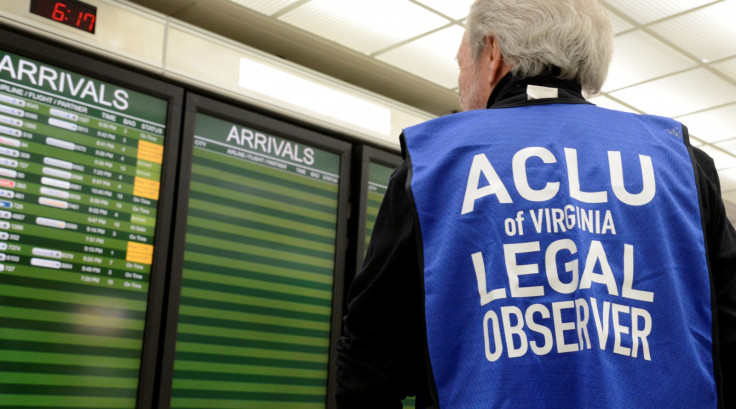Lawyers blocked from helping travellers detained under Trump's US Muslim ban
Attorneys say detainees are being handcuffed and taken off site to skirt federal court injunction.

Lawyers are being denied access to people who were detained and barred from entering the US at airports across American after President Donald Trump signed a surprise "Muslim ban" on Friday.
Some people stopped from entering America under the order are being handcuffed and removed from airports to detention centres in contravention of injunctions by at least two federal courts, according to lawyers. Trump's executive order came without warning on 27 January and blocks people from seven mainly Muslim Middle Eastern nations from entering the US.
"Latest word here at Dulles is that those being detained are now very quietly and quickly being cuffed and shipped offsite to detention centers to circumvent the EDVA order requiring access to counsel at Dulles," said a lawyer at Dulles International Airport (IAD) outside Washington DC to Adam Blickstein, a former Pentagon and congressional communications staffer.
"I'm a lawyer here at IAD and I can corroborate this concern," said Hailly T.N. Korman, a civil rights lawyer who is also at the airport seeking to provide legal aid to detainees. "Arriving passengers are being denied entry, denied legal counsel. [Customs and Border Protection] refusing to talk to congresspeople," she wrote on Twitter. "Reports of Dulles detainees being sent offsite are still unconfirmed, but attorneys are working hard to investigate," Korman wrote later.
US Customs and Border Protection did not respond to a request for comment and confirmation about whether they are moving detainees.
If detainees are being moved off site and being processed for deportation, it would go against at least two federal nationwide injunctions against Trump's executive order.
One injunction issued by a federal court in Virginia on Sunday 29 January bars the Department of Homeland Security [DHS] from removing 50-60 people detained at Dulles Airport "who are legal permanent residents, but were refused admission into the country because they are citizens of the seven countries" listed in Trump's executive order, said a statement by the Legal Aid Justice Center.
I'm a lawyer here at #IAD and I can corroborate this concern. https://t.co/htCnS8MpBB
— Hailly T.N. Korman (@HaillyKorman) 29 January 2017
DHS customs officers "refused to allow the individuals to speak to family members or lawyers and had stated that it planned to send all of them out of the United States" in contravention of the court, it said. Another federal injunction issued by Brooklyn New York Federal Judge Ann Donnelly on Saturday 28 January also temporarily blocks Trump's executive order so that deportees can receive due process.
Trump signed the Protecting the Nation From Foreign Terrorist Entry Into The United States executive order last Friday. It bans people from seven mainly Muslim countries, including Iran, Iraq, Libya, Somalia, Sudan, Syria and Yemen from entering the US for 90 days. It also stops refugee applications from these nations for four months and bans Syrian refugees from the US indefinitely. The order is open for extension and expansion to include other countries.
On Sunday 29 the DHS said that customs officers has immediately begun "taking steps to comply with the orders" and that everyone "affected by the executive orders, including those affected by the court orders, are being provided all rights afforded under the law."
Despite the rulings Los Angeles City's Attorney Mike Feuer said that he was turned away when he attempted to get access to people detained at the Los Angeles airport (LAX) on Sunday 29 January. "I went to LAX last night because I wanted to secure the release of the detainees. I also wanted very direct answers to basic questions," said Feuer.
FULL STATEMENT from Mike Feuer on the appalling #detainee situation at #lax: https://t.co/s7oRraK714 #MuslimBan #CivilRights #losangeles pic.twitter.com/3Oq5RmlIDJ
— LA City Attorney (@CityAttorneyLA) January 30, 2017
Feuer wanted to know whether the government was complying with the injunction and "how many people were being detained," he said, but didn't get any answers.
"It was a very frustrating and complex night," he said, "because federal officials were unable and unwilling to provide any information."
© Copyright IBTimes 2024. All rights reserved.






















